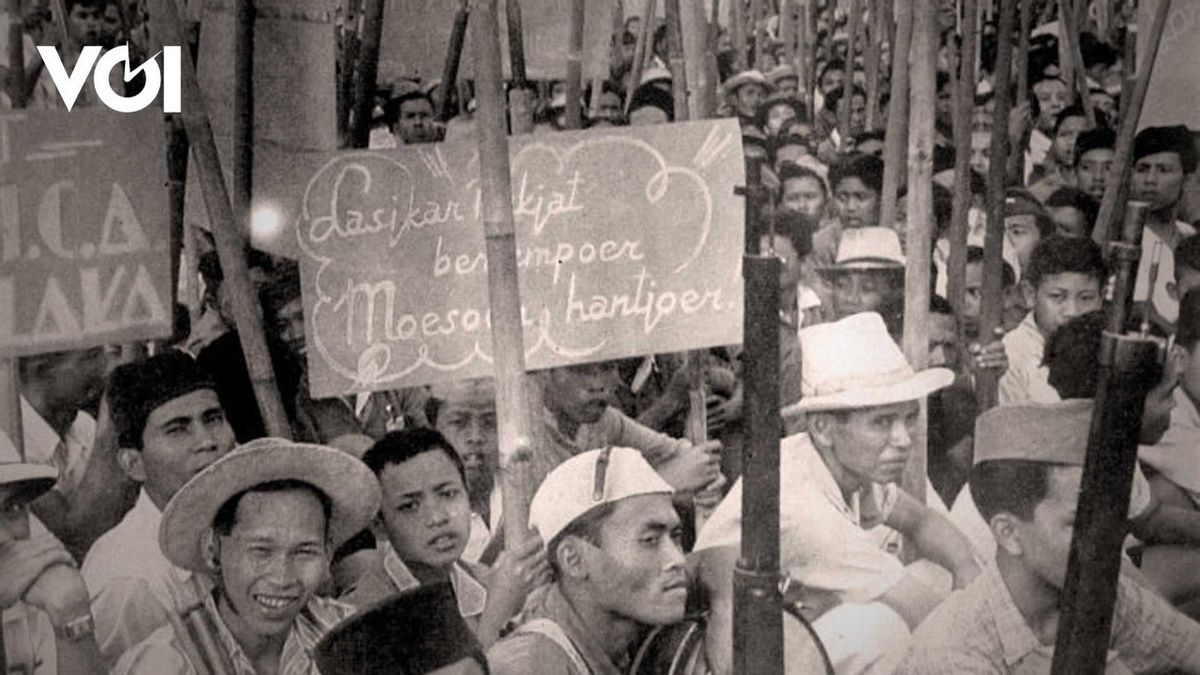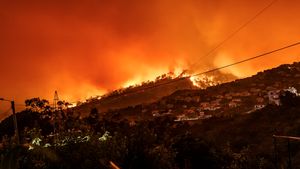JAKARTA - The revolutionary movement that reached its climax after the proclamation of independence sparked a very strong spirit of war. It's good, for sure. But that doesn't mean it doesn't have "side effects." The revolution was like a snowball, rolling out of control, giving birth to violence against anyone who was pro-colonial. This dark period occurs during the Preparation Period.
The Bersiap period, according to Tri Wahyuning M. Irsyam in the book Developing in the Shadows of Jakarta: Sejarak Depok 1950-1990s (2017) began in October 1945. It was called "Bersiap" because at that time the call to "prepare" was shouted every time allied soldiers or Dutch troops patrol the streets. Those who hear the call must stand up straight and not speak.
The atmosphere of the Bersiap period truly reflected the mentality of the Indonesian people at that time. Historian JJ Rizal explained that during the Japanese era, the anti-colonialism movement was formed with military colors for the benefit of the Great East Asian War. "However, it produces a byproduct in the form of an anti-imperialist spirit," Rizal told VOI.
The youths received paramilitary training in the ranks of Seinendan, Keibodan, Peta and others. They gain experience in acting collectively in the ties of military organizations. "The spirit of war still remains, so emotionally there is strong motivation to take up arms," said Rizal.
Another important factor behind the emergence of the Bersiap period was when the Dutch lost their prestige after being attacked by Japan. Meanwhile, the people were increasingly resentful of the Dutch arrogant attitude by ignoring the suggestions of the movement, even though their situation was in a downturn.
"This is the setting of the preparatory era which shows that the structural tendency creates positive conditions for the birth of a revolutionary movement. It is in this situation that it can be understood that the birth of numerous and spontaneous struggle bodies after the proclamation was read," explained Rizal. The Preparedness overthrew the old order.
Cause and effectSince Japan was defeated by the Allies, the Dutch who had been held captive by the Japanese have returned to their respective homes. It was as if they had just come out of hell, considering how miserable they were under the reign of Dai Nippon.
However, as told by Tjamboek Berdoeri or Kwee Thiam Tjing in his book Indonesia Dalem Api and Bara, the Dutch, who were too happy to have separated from Japan, felt so arrogant that they uttered words that offended non-Dutch people.
Maybe they forgot, the people's anti-colonialism and anti-imperialism awareness was already strong. Ridicule such as the vuile Chinees (dirty China) or the vuile Inlander (dirty native) that comes out of the mouths of a londo person can spark big clashes.
Kwee Thiam Tjing gave an example of a Dutch lady who was hit by her sap when she acted violently. "Finally one night he was transported to the hospital and his house was burned to the ground," wrote Tjing.
Tjing said that the arrival of the Allies in Indonesia also made the Dutch people puffed up. One day in Kayutangan, Malang, he saw that in the back of the truck several indigenous people were hanged. Some have tattered clothes, some are completely naked. Meanwhile, blood was seen splattered around him.
Unclean retributionIncidents like that may be common to indigenous people. However, the difference is that now they have dared to fight back. Indonesia is already formed, they are starting to move.
The people began to form pro-revolution armies. Societies, from small to large, sprang up. Almost all of its members have weapons captured by the Japanese military. They began to take their revenge on the Dutch people.
Agitations appear in remote areas. Many placards encouraged indigenous people, especially from the working class, not to sell anything to the Dutch anymore. The lights and water were cut off. They were totally boycotted.
The chaos of the Preparedness occurred from the end of 1945 to 1946. The times were full of uncertainty at that time.
This is because, at the beginning of the Japanese administration's conquest, the Indonesian government was not yet effective. There were still many bureaucrats and collaborators who were kidnapped, some were killed, some had their offices and houses looted because they were considered to be "Japanese dogs" who also made it difficult for the revolution.
Looting, arson, persecution, rape and murder took place in several corners of the city. The perpetrators were a number of gangs on behalf of themselves as part of the people's laskar fighting to defend independence. Tjing called them the "Jamino and Joliteng" group.

The remains of a body possibly killed during the Preparing Period in Java (Source: Netherlands Indies Government Information Service)
Criminal acts continue to take place in various regions in Java and Sumatra. In Java several quite well-known incidents took place in many places including Depok, Surabaya and Malang.
They were welcome to do whatever they could as long as they helped evacuate the city to support the scorched earth politics elected by the Republic. According to Gert Oostindie, in the "Dutch Soldier in Indonesia 1945-1950", the estimated number of Europeans killed in the Bersiap period ranged from 3,500 to 20,000.
The revolutions seem like there are no limits. Looting, murdering and rape of colonial people occurred without anyone daring to prevent it. It's hard not to call it an act of excess.
The English, Chinese, Japanese, Arabic, and French versions are automatically generated by the AI. So there may still be inaccuracies in translating, please always see Indonesian as our main language. (system supported by DigitalSiber.id)









